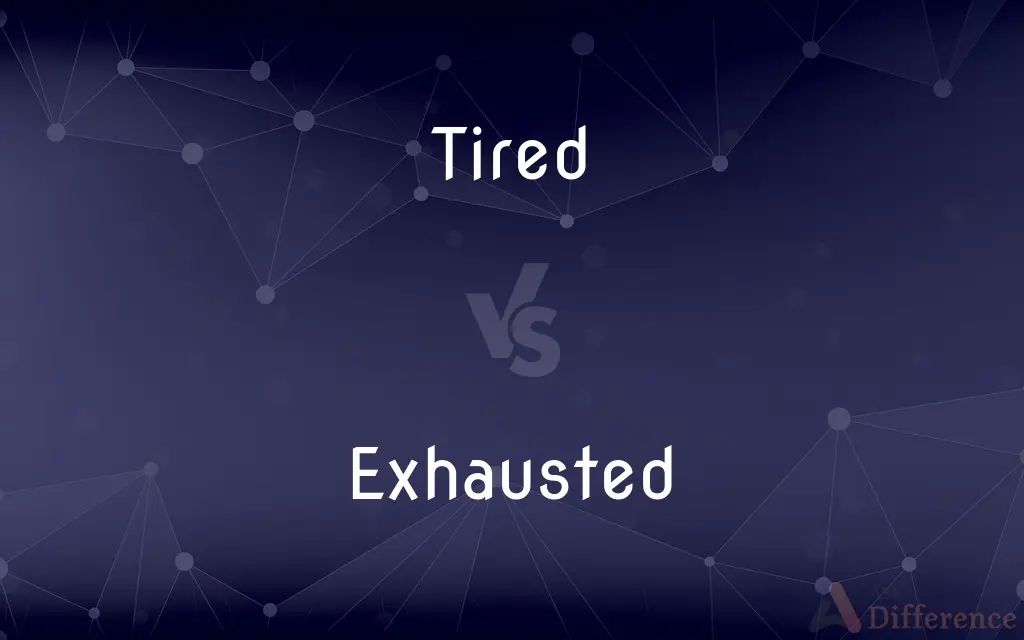Tired vs. Exhausted — What's the Difference?
Edited by Tayyaba Rehman — By Maham Liaqat — Updated on April 17, 2024
Tiredness is a general state of weariness often remediable by basic rest, whereas exhaustion denotes a more severe depletion requiring significant recovery.

Difference Between Tired and Exhausted
Table of Contents
ADVERTISEMENT
Key Differences
Tiredness occurs with normal daily activities and can often be relieved by a short rest or a good night's sleep, whereas exhaustion is a deeper state of fatigue that can result from prolonged physical or mental activity and may demand more extensive rest.
Tiredness often suggests a lighter, more manageable level of fatigue that might simply indicate the body’s normal need for rest at the end of a busy day, while exhaustion implies an overwhelming sense of tiredness that can affect one's overall functionality and often results from overexertion or stress.
People who are tired might find that their condition improves after resting or disengaging from routine tasks; exhausted individuals, on the other hand, may experience a more persistent fatigue that isn't easily alleviated by usual rest or sleep.
Tiredness can affect anyone following ordinary daily exertions, suggesting a common and expected level of fatigue, whereas exhaustion might indicate underlying health issues or extreme physical demands and requires more careful attention and recovery strategies.
While tiredness is generally more transient and easier to remedy, exhaustion may carry with it additional symptoms like impaired judgment, reduced immune function, and a significant decrease in physical and cognitive performance.
ADVERTISEMENT
Comparison Chart
Intensity
Mild to moderate
Severe
Recovery Needed
Short rest or a good night’s sleep
Extended rest, possibly medical intervention
Causes
Daily activities, lack of sleep
Prolonged stress, overexertion, health issues
Impact on Functionality
Minimal to moderate
Significant to severe
Symptoms
Yawning, slight decrease in alertness
Impaired cognitive functions, physical weakness, possible health complications
Compare with Definitions
Tired
Feeling a need to rest or sleep.
After the long drive, she felt tired and decided to go to bed early.
Exhausted
Having used all of something; depleted.
The long drought exhausted the city’s water supplies.
Tired
Used to express exasperation.
She was tired of their constant arguing.
Exhausted
Drained of physical or mental resources; very tired.
After the weeklong conference, he was completely exhausted.
Tired
Lacking enthusiasm or energy.
She was too tired to go to the party.
Exhausted
Explored or discussed thoroughly.
The book exhausted all aspects of the theory.
Tired
Weary or bored with something.
He grew tired of the same lunch every day.
Exhausted
Very tired; fatigued to an extreme degree.
She was exhausted after the double shift at work.
Tired
Drained of strength; fatigued.
The marathon runners were visibly tired at the finish line.
Exhausted
Resulting from or suffering severe fatigue.
His exhausted mind struggled to focus.
Tired
Exhausted of strength or energy; fatigued.
Exhausted
To make extremely weary; wear out.
Tired
Impatient; bored
Tired of the same old sandwiches.
Exhausted
To escape or pass out
Steam exhausts through this valve.
Tired
Overused; hackneyed
A tired joke.
Exhausted
The escape or release of vaporous waste material, as from an engine.
Tired
Simple past tense and past participle of tire
Exhausted
The fumes or gases so released.
Tired
In need of some rest or sleep.
Exhausted
A duct or pipe through which waste material is emitted.
Tired
Fed up, annoyed, irritated, sick of.
I'm tired of this
Exhausted
An apparatus for drawing out noxious air or waste material by means of a partial vacuum.
Tired
Overused, cliché.
A tired song
Exhausted
Very tired; in a state of exhaustion.
The exhausted man fell asleep immediately.
Tired
Ineffectual; incompetent
Exhausted
Depleted of resources.
The exhausted mine was worthless once all the ore had been extracted.
Tired
Weary; fatigued; exhausted.
Exhausted
Emptied of contents, especially of air; that has been made into a vacuum.
Tired
Depleted of strength or energy;
Tired mothers with crying babies
Too tired to eat
Exhausted
Simple past tense and past participle of exhaust
Tired
Repeated too often; overfamiliar through overuse;
Bromidic sermons
His remarks were trite and commonplace
Hackneyed phrases
A stock answer
Repeating threadbare jokes
Parroting some timeworn axiom
The trite metaphor `hard as nails'
Exhausted
Same as burned-out, 1.
Exhausted
Used up; completely consumed.
Exhausted
Emptied by being pumped out or having a vacuum created. Opposite of unexhausted.
Exhausted
Drained of energy or effectiveness; extremely tired; completely exhausted;
The day's shopping left her exhausted
He went to bed dog-tired
Was fagged and sweaty
The trembling of his played out limbs
Felt completely washed-out
Only worn-out horses and cattle
You look worn out
Exhausted
Completely emptied of resources or properties;
Impossible to grow tobacco on the exhausted soil
The exhausted food sources
Exhausted oil wells
Exhausted
Drained physically;
The day's events left her completely exhausted--her strength drained
Common Curiosities
What causes tiredness?
Tiredness can result from routine activities or lack of sleep.
What differentiates being tired from being exhausted?
The intensity and recovery needs differentiate tiredness from exhaustion.
Can a person still function while exhausted?
Functionality can be significantly reduced when a person is exhausted.
Does exhaustion affect mental health?
Yes, prolonged exhaustion can negatively impact mental health.
How can one recover from tiredness?
Recovery often involves taking short rests or getting adequate sleep.
What are some severe impacts of exhaustion?
Severe impacts include impaired cognitive functions and physical weakness.
Is it normal to feel tired every day?
Feeling tired daily might be normal depending on lifestyle, but persistent fatigue could be a sign of underlying issues.
What are common symptoms of being tired?
Common symptoms include yawning and a mild decrease in alertness.
Can exhaustion have health implications?
Yes, prolonged exhaustion can lead to health issues and weakened immune response.
Is exhaustion always a result of physical activity?
No, mental or emotional stress can also lead to exhaustion.
How does one typically recover from exhaustion?
Recovery may require extended rest periods and potentially medical help.
What immediate actions should one take if feeling exhausted?
It's advised to stop all strenuous activities and seek rest or medical advice if needed.
How quickly does one recover from tiredness compared to exhaustion?
Recovery from tiredness is usually quicker than from exhaustion.
Are there long-term effects of frequent exhaustion?
Yes, frequent exhaustion can lead to chronic health problems.
What preventive measures can avoid exhaustion?
Regular breaks, adequate sleep, and stress management can help prevent exhaustion.
Share Your Discovery

Previous Comparison
Suite vs. Room
Next Comparison
Wolf vs. CoyoteAuthor Spotlight
Written by
Maham LiaqatEdited by
Tayyaba RehmanTayyaba Rehman is a distinguished writer, currently serving as a primary contributor to askdifference.com. As a researcher in semantics and etymology, Tayyaba's passion for the complexity of languages and their distinctions has found a perfect home on the platform. Tayyaba delves into the intricacies of language, distinguishing between commonly confused words and phrases, thereby providing clarity for readers worldwide.














































